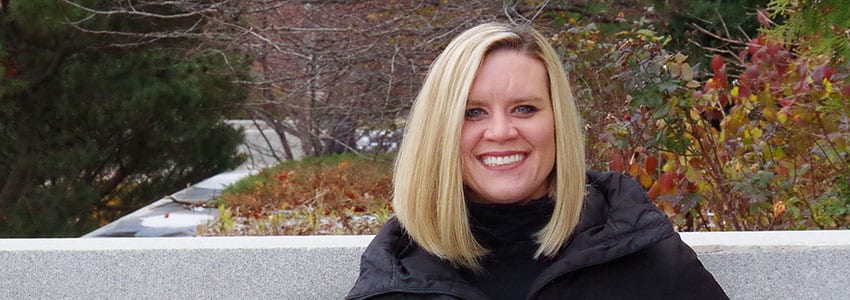After finishing her M.P.H. degree in Epidemiology at U-M in 2011, Lauren worked as a consultant at an environmental and occupational health consulting firm where she assessed chemical exposures and health risks in the workplace. That experience motivated her to delve deeper into the environmental health field so she turned to Dr. John Meeker in the School of Public Health whose research focuses on environmental epidemiology, specifically on how environmental exposures affect reproductive health.
She explains, “I knew he worked on reproductive health research and contacted him. It’s been like home ever since. I love my lab group and my advisor is extremely supportive.” Returning to U-M and to the School of Public Health felt like home to her, but she says, “I came back to a different department than I was in for my Master’s. There is more emphasis on toxicology and the biological mechanisms through which chemicals may influence health outcomes whereas epidemiology is a bit more methods heavy.”
Lauren is studying how phthalates (plasticizing chemicals found in numerous industrial and consumer products) affect hormone levels in pregnant women. “Phthalates are endocrine disrupters that can alter hormone levels. They are a ubiquitous in the environment and we are all constantly exposed to them in low doses, from things like cosmetics or food packaging. I specifically study how phthalates alter thyroid hormone levels in pregnant women, and how subtle changes in these hormones may influence downstream birth outcomes, such as fetal growth and preterm birth. We are focusing on minute changes in hormone levels because pregnancy represents a sensitive period of development during which even subtle disturbances in the maternal endocrine system may have profound effects on the mom and her baby.”
Using cohorts of pregnant women in Puerto Rico and Boston, Lauren and her advisor have collected multiple biological samples in a longitudinal study over the course of a pregnancy to examine the trajectory of changes over time, looking for windows of sensitivity for women and hormones. She says, “I want to know the time points when it matters most for exposure and how that exposure may affect a pregnant woman’s hormonal profile over time.”
As happens so often, one research project and data set leads to another. Lauren is pursuing additional research on other hormones and chemicals, examining the similar relationships with vitamin D and bone health, which is a hormone mediated process.
Lauren is spending her next (and last) year on data analysis and completing a few papers along the way. She says, “I’m getting to the crux of my research and thinking of additional analyses. Getting a predoctoral fellowship is allowing me to pursue ideas; without it I’d have to finish earlier. I can delve more into research and some ancillary projects, which is pretty cool. It will make me more marketable.”
Lauren is highly invested in her research but very open to where that could lead her. “I’ve been reaching out to various entities for nonacademic work. I’m interested in potentially staying in academia as well. Regardless of where I end up, I’m interested in a career that has a rigorous scientific component and will challenge me intellectually and personally. I hope to secure something by the time I defend next spring.”
She laughs as she comments about her experience in graduate school: “I have had a unique experience in that I have mostly enjoyed it. My advisor is super supportive and my lab has a lot of comradery. Because I was in epidemiology before, I had to take classes in toxicology and bioinformatics – so there were great challenges in learning these new concepts. I’ve also learned a lot about collaboration from working within my lab group when it comes to writing papers and grants, for example. I was well funded and didn’t have to teach, which gave me the freedom to explore other ideas or potential job opportunities that I hadn’t considered before.”
A former college basketball player, Lauren still plays ball in a variety of formats, from basketball to social sports leagues like kick ball, and she attends sporting events when she can on campus. These activities break up her schedule and help with the dueling challenges of time management and work-life balance, the biggest issues she faces in grad school. On life in Michigan overall, she comments, “I like Ann Arbor; it is a tight knit community, and a really easy place to live. I like the variety of festivals and the community based feel. It is a very supportive town. Despite being a grad student, I feel I have a pretty good standard of living.” she shares.
Her experience has a lot to do with funding as well. “I am very appreciative of the Predoctoral Fellowship. Not only is it great for the Department of Environmental Health Sciences to have another Ph.D. student receive one, but it recognizes the work we are doing. This has opened a lot of doors in that I’m not going to have to rush to finish my thesis or to find a job. I can explore my research more in depth, and this award also helps me gain more professional development that I may not have been able to pursue otherwise. By freeing up lab funds because he didn’t need to fund me, my advisor will also able to add additional students to our lab.”

